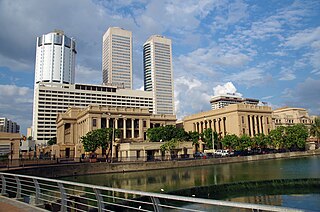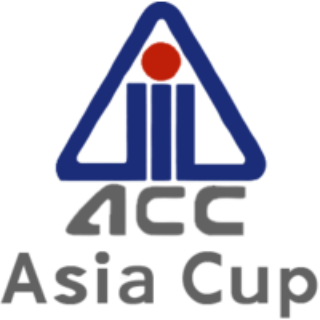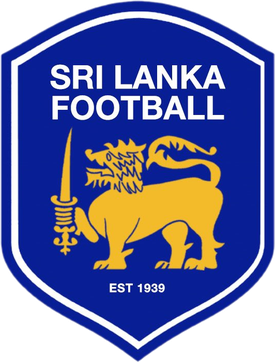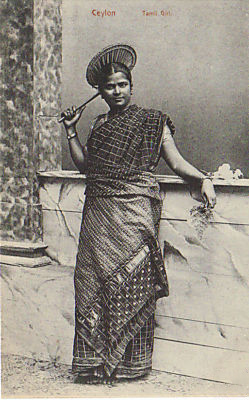Dippitiya | |
|---|---|
Village | |
| Country | Sri Lanka |
| Province | Sabaragamuwa Province |
| Time zone | UTC+5:30 (Sri Lanka Standard Time) |
Dippitiya is a village in Sri Lanka. It is located within Sabaragamuwa Province.
Dippitiya | |
|---|---|
Village | |
| Country | Sri Lanka |
| Province | Sabaragamuwa Province |
| Time zone | UTC+5:30 (Sri Lanka Standard Time) |
Dippitiya is a village in Sri Lanka. It is located within Sabaragamuwa Province.

The Liberation Tigers of Tamil Eelam was a Tamil militant organization that was based in northeastern Sri Lanka. The LTTE fought to create an independent Tamil state called Tamil Eelam in the north-east of the island, due to the continuous discrimination and violent persecution against Sri Lankan Tamils by the Sinhalese dominated Sri Lankan Government.

Sri Lanka, formerly known as Ceylon and officially the Democratic Socialist Republic of Sri Lanka, is an island country in South Asia. It lies in the Indian Ocean, southwest of the Bay of Bengal, separated from the Indian peninsula by the Gulf of Mannar and the Palk Strait. Sri Lanka shares a maritime border with the Maldives in the south-west and India in the north-west.

The history of Sri Lanka is intertwined with the history of the broader Indian subcontinent and the surrounding regions, comprising the areas of South Asia, Southeast Asia and the Indian Ocean. The early human remains found on the island of Sri Lanka date to about 38,000 years ago.

Sinhalese people are an Indo-Aryan ethnolinguistic group native to the island of Sri Lanka. They were historically known as Hela people. They constitute about 75% of the Sri Lankan population and number more than 16.2 million. The Sinhalese identity is based on language, cultural heritage and nationality. The Sinhalese people speak Sinhala, an insular Indo-Aryan language, and are predominantly Theravada Buddhists, although a minority of Sinhalese follow branches of Christianity and other religions. Since 1815, they were broadly divided into two respective groups: The 'Up-country Sinhalese' in the central mountainous regions, and the 'Low-country Sinhalese' in the coastal regions; although both groups speak the same language, they are distinguished as they observe different cultural customs.

Colombo is the executive and judicial capital and largest city of Sri Lanka by population. According to the Brookings Institution, Colombo metropolitan area has a population of 5.6 million, and 752,993 in the Municipality. It is the financial centre of the island and a tourist destination. It is located on the west coast of the island and adjacent to the Greater Colombo area which includes Sri Jayawardenepura Kotte, the legislative capital of Sri Lanka, and Dehiwala-Mount Lavinia. Colombo is often referred to as the capital since Sri Jayawardenepura Kotte is itself within the urban/suburban area of Colombo. It is also the administrative capital of the Western Province and the district capital of Colombo District. Colombo is a busy and vibrant city with a mixture of modern life, colonial buildings and monuments.

The Sri Lankan Civil War was a civil war fought in Sri Lanka from 1983 to 2009. Beginning on 23 July 1983, there was an intermittent insurgency against the government by the Velupillai Prabhakaran-led Liberation Tigers of Tamil Eelam. The LTTE fought to create an independent Tamil state called Tamil Eelam in the north-east of the island, due to the continuous discrimination and violent persecution against Sri Lankan Tamils by the Sinhalese dominated Sri Lankan Government.

The Tamil people, also known as Tamilar, or simply Tamils, are a Dravidian ethno-linguistic group who trace their ancestry mainly to India’s southern state of Tamil Nadu, union territory of Puducherry and to Sri Lanka. Tamils who speak the Tamil Language and are born in Tamil clans are considered Tamilians. Tamils constitute 5.9% of the population in India, 15% in Sri Lanka, 7% in Malaysia, 6% in Mauritius, and 5% in Singapore.

The Sri Lanka men's national cricket team, nicknamed The Lions, represents Sri Lanka in men's international cricket. It is a Full Member of the International Cricket Council (ICC) with Test, One-Day International (ODI) and T20 International (T20I) status. The team first played international cricket in 1926–27, and were later awarded Test status in 1981, which made Sri Lanka the eighth Test cricket playing nation. The team is administered by Sri Lanka Cricket.

Velupillai Prabhakaran (listen ; Tamil: வேலுப்பிள்ளை பிரபாகரன்; Tamil pronunciation: [ˈʋeːlɯpːiɭːaɪ pɾaˈbaːhaɾan], was a Sri Lankan Tamil guerrilla and the founder and leader of the Liberation Tigers of Tamil Eelam, a militant organization that sought to create an independent Tamil state in the north and east of Sri Lanka, due to the oppression of Sri Lankan Tamils by the Sri Lankan Government. The LTTE waged war in Sri Lanka for more than 25 years, to create an independent state for the Sri Lankan Tamil people.
SriLankan Airlines is the flag carrier of Sri Lanka and a member airline of the Oneworld airline alliance. It is currently the largest airline in Sri Lanka by number of aircraft and destinations and was launched in 1979 as Air Lanka following the termination of operations of the original Sri Lankan flag carrier Air Ceylon. Following its partial acquisition in 1998 by Emirates, it was re-branded and the current livery was introduced. In 2008, the government of Sri Lanka acquired all the shares of the airline from Emirates. After ending the Emirates partnership, it retained its re-branded name and logo. SriLankan Airlines operates over 560 flights per week across Asia.

The Asian Cricket Council Asia Cup is a men's One Day International and Twenty20 International cricket tournament. It was established in 1983 when the Asian Cricket Council was founded as a measure to promote goodwill between Asian countries. It was originally scheduled to be held every two years. The Asia Cup is the only continental championship in cricket and the winning team becomes the champions of Asia. It alternates every 2-years between ODI and T20I formats.

Mahinda Rajapaksa is a Sri Lankan politician. He served as the President of Sri Lanka from 2005 to 2015; the Prime Minister of Sri Lanka from 2004 to 2005, 2018, and 2019 to 2022; the Leader of the Opposition from 2002 to 2004 and 2018 to 2019, and the Minister of Finance from 2005 to 2015 and 2019 to 2021. He has been a Member of Parliament (MP) for Kurunegala since 2015.

Provinces are the first level administrative divisions of Sri Lanka. Currently, Sri Lanka is divided into 9 provinces. Each province is further divided into districts, which are further divided into divisional secretariats.

The Sri Lanka national football team represents Sri Lanka in Association football and is administered by Football Sri Lanka, the governing body of football in Sri Lanka. They have been a member of FIFA since 1952 and a member of AFC since 1954. Sri Lanka's home stadium is the Sugathadasa Stadium in Colombo. The Sri Lankan team was known as the Ceylon national football team until 1972 when Ceylon was renamed Sri Lanka.

UTC+5:30 is an identifier for a time offset from UTC of +05:30. This time is used in India and Sri Lanka, and was formerly used in Nepal. It is five and a half hours ahead of Coordinated Universal Time. Around 1.4 billion people live inside this time zone, making it the second-most populous after UTC+08:00.

Districts are the second level administrative divisions of Sri Lanka, preceded by provinces. Sri Lanka has 25 districts organized into 9 provinces. Districts are further divided into a number of divisional secretariats, which are in turn subdivided into 14,022 grama niladhari divisions. There are 331 DS divisions in Sri Lanka.

Sri Lankan Tamils, also known as Ceylon Tamils or Eelam Tamils, are Tamils native to the South Asian island state of Sri Lanka. Today, they constitute a majority in the Northern Province, live in significant numbers in the Eastern Province and are in the minority throughout the rest of the country. 70% of Sri Lankan Tamils in Sri Lanka live in the Northern and Eastern provinces.

Several languages are spoken in Sri Lanka within the Indo-Aryan, Austronesian, and Dravidian families. Sri Lanka accords official status to Sinhala and Tamil, and English as a recognised language. The languages spoken on the island nation are deeply influenced by the various languages in India, Europe and Southeast Asia. Arab settlers and the colonial powers of Portugal, the Netherlands and Britain have also influenced the development of modern languages in Sri Lanka. See below for the most-spoken languages of Sri Lanka.

Films produced in Sri Lanka ordered by the date of release

The Sri Lankan economic crisis is an ongoing crisis in the island country of Sri Lanka that started in 2019. It is the country's worst economic crisis since its independence in 1948. It has led to unprecedented levels of inflation, near-depletion of foreign exchange reserves, shortages of medical supplies, and an increase in prices of basic commodities. The crisis is said to have begun due to multiple compounding factors like tax cuts, money creation, a nationwide policy to shift to organic or biological farming, the 2019 Sri Lanka Easter bombings, and the impact of the COVID-19 pandemic in Sri Lanka. The subsequent economic hardships resulted in the 2022 Sri Lankan protests.